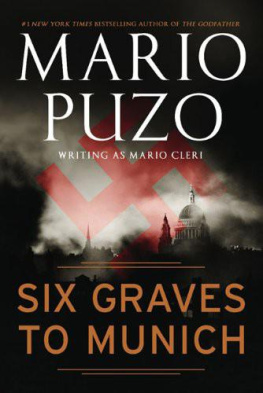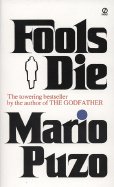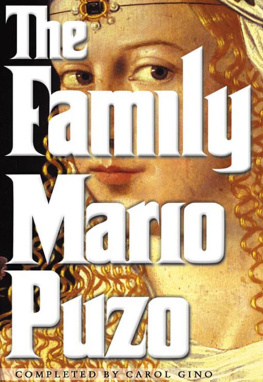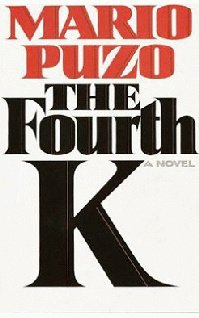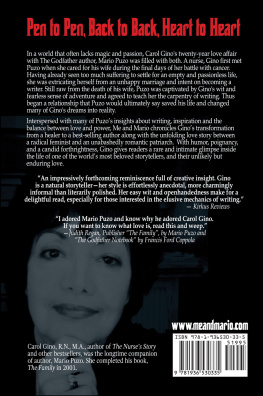Annotation
Michael Corleone stands on the dock at Palermo. His two-year exile in Sicily is over, but the Godfather has charged him with a mission: do not return to America until he can bring with him the man named Salvatore Guilano. Giuliano a legend, the bandit ruler of Western Sicily, a vicious leader fighting for his peasant countrymen against the corrupt government of Rome. But Guiliano's deadliest battle is not with the police or the armies of Rome, but with Don Croce malo, the ruthless Capo di Capi of the Mafia. By challenging the Don's iron-clad control, Guiliano sets in motion a feverish war in which the loser must surely die. Enter Michael Corleone, at sea amid a flood of treachery, passion, and deceit. The secret is that he soon discovers promises greater success than Michael hoped for and the cruelest threat he has ever faced. Once again, Mario Puzo has created a masterful story of evil on an epic scale, mesmerizing us with the terrible magic of the Mafia.
Mario Puzo
The Sicilian
BOOK I
MICHAEL CORLEONE
1950
Chapter 1
Michael Corleone stood on a long wooden dock in Palermo and watched the great ocean liner set sail for America. He was to have sailed on that ship, but new instructions had come from his father.
He waved goodbye to the men on the little fishing boat who had brought him to this dock, men who had guarded him these past years. The fishing boat rode the white wake of the ocean liner, a brave little duckling after its mother. The men on it waved back; he would see them no more.
The dock itself was alive with scurrying laborers in caps and baggy clothes unloading other ships, loading trucks that had come to the long dock. They were small wiry men who looked more Arabic than Italian, wearing billed caps that obscured their faces. Amongst them would be new bodyguards making sure he came to no harm before he met with Don Croce Malo, Capo di Capi of the "Friends of the Friends," as they were called here in Sicily. Newspapers and the outside world called them the Mafia, but in Sicily the word Mafia never passed the lips of the ordinary citizen. As they would never call Don Croce Malo the Capo di Capi but only "The Good Soul."
In his two years of exile in Sicily, Michael had heard many tales about Don Croce, some so fantastic that he almost did not believe in the existence of such a man. But the instructions relayed from his father were explicit: he was ordered to have lunch with Don Croce this very day. And the two of them were to arrange for the escape from Sicily of the country's greatest bandit, Salvatore Guiliano. Michael Corleone could not leave Sicily without Guiliano.
Down at the end of the pier, no more than fifty yards away, a huge dark car was parked in the narrow street. Standing before it were three men, dark rectangles cut out of the glaring sheet of light that fell like a wall of gold from the sun. Michael walked toward them. He paused for a moment to light a cigarette and survey the city.
Palermo rested in the bottom of a bowl created by an extinct volcano, overwhelmed by mountains on three sides, and escaping into the dazzling blue of the Mediterranean Sea on the fourth side. The city shimmered in the golden rays of the Sicilian noontime sun. Veins of red light struck the earth, as if reflecting the blood shed on the soil of Sicily for countless centuries. The gold rays bathed stately marble columns of Greek temples, spidery Moslem turrets, the fiercely intricate facades of Spanish cathedrals; on a far hillside frowned the battlements of an ancient Norman castle. All left by diverse and cruel armies that had ruled Sicily since before Christ was born. Beyond the castle walls, cone-shaped mountains held the slightly effeminate city of Palermo in a strangler's embrace, as if both were sinking gracefully to their knees, a cord pulling tightly around the city's neck. Far above, countless tiny red hawks darted across the brilliant blue sky.
Michael walked toward the three men waiting for him at the end of the pier. Features and bodies formed out of their black rectangles. With each step he could see them more clearly and they seemed to loosen, to spread away from each other as if to envelop him in their greeting.
All three of these men knew Michael's history. That he was the youngest son of the great Don Corleone in America, the Godfather, whose power extended even into Sicily. That he had murdered a high police official of New York City while executing an enemy of the Corleone Empire. That he had been in hiding and exile here in Sicily because of those murders and that now finally, matters having been "arranged," he was on his way back to his homeland to resume his place as crown prince to the Corleone Family. They studied Michael, the way he moved so quickly and effortlessly, his watchful wariness, the caved-in side of his face which gave him the look of a man who had endured suffering and danger. He was obviously a man of "respect."
As Michael stepped off the pier the first man to greet him was a priest, body plump in cassock, his head crowned by a greasy batlike hat. The white clerical collar was sprinkled with red Sicilian dust, the face above was worldly with flesh.
This was Father Beniamino Malo, brother to the great Don Croce. He had a shy and pious manner, but he was devoted to his renowned relative and never flinched at having the devil so close to his bosom. The malicious even whispered that he handed over the secrets of the confessional to Don Croce.
Father Beniamino smiled nervously as he shook Michael's hand and seemed surprised and relieved by Michael's friendly, lopsided grin, so unlike that of a famous murderer.
The second man was not so cordial, though polite enough. This was Inspector Federico Velardi, head of the Security Police of all Sicily. He was the only one of the three who did not have a welcoming smile on his face. Thin and far too beautifully tailored for a man who received a government salary, his cold blue eyes shot two genetic bullets from long-ago Norman conquerors. Inspector Velardi could have no love for an American who killed high-ranking police officials. He might try his luck in Sicily. Velardi's handshake was like the touching of swords.
The third man was taller and bulkier; he seemed huge beside the other two. He imprisoned Michael's hand, then pulled him forward into an affectionate embrace. "Cousin Michael," he said. "Welcome to Palermo." He drew back and regarded Michael with a fond but wary eye. "I am Stefano Andolini, your father and I grew up together in Corleone. I saw you in America, when you were a child. Do you remember me?"
Oddly enough Michael did remember. For Stefano Andolini was that rarest of all Sicilians, a redhead. Which was his cross, for Sicilians believe that Judas was a redheaded man. His face too was unforgettable. The mouth was huge and irregular, the thick lips like bloody hacked meat; above were hairy nostrils, and eyes cavernous in deep sockets. Though he was smiling, it was a face that made you dream of murder.
With the priest, Michael understood the connection at once. But Inspector Velardi was a surprise. Andolini, carrying out the responsibility of a relative, carefully explained to Michael the Inspector's official capacity. Michael was wary. What was the man doing here? Velardi was reputed to be one of Salvatore Guiliano's most implacable pursuers. And it was obvious that the Inspector and Stefano Andolini disliked each other; they behaved with the exquisite courtesy of two men readying themselves for a duel to the death.
The chauffeur had the car door open for them. Father Beniamino and Stefano Andolini ushered Michael into the back seat with deferential pats. Father Beniamino insisted with Christian humility that Michael sit by the window while he sat in the middle, for Michael must see the beauties of Palermo. Andolini took the other back seat. The Inspector had already jumped in beside the chauffeur. Michael noticed that Inspector Velardi held the door handle so that he could twist it open quickly. The thought passed through Michael's mind that perhaps Father Beniamino had scurried into the middle seat to make himself less of a target.



